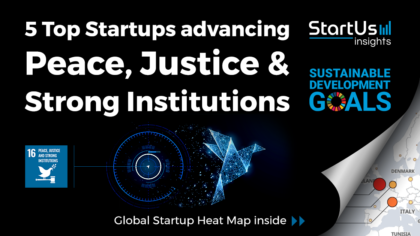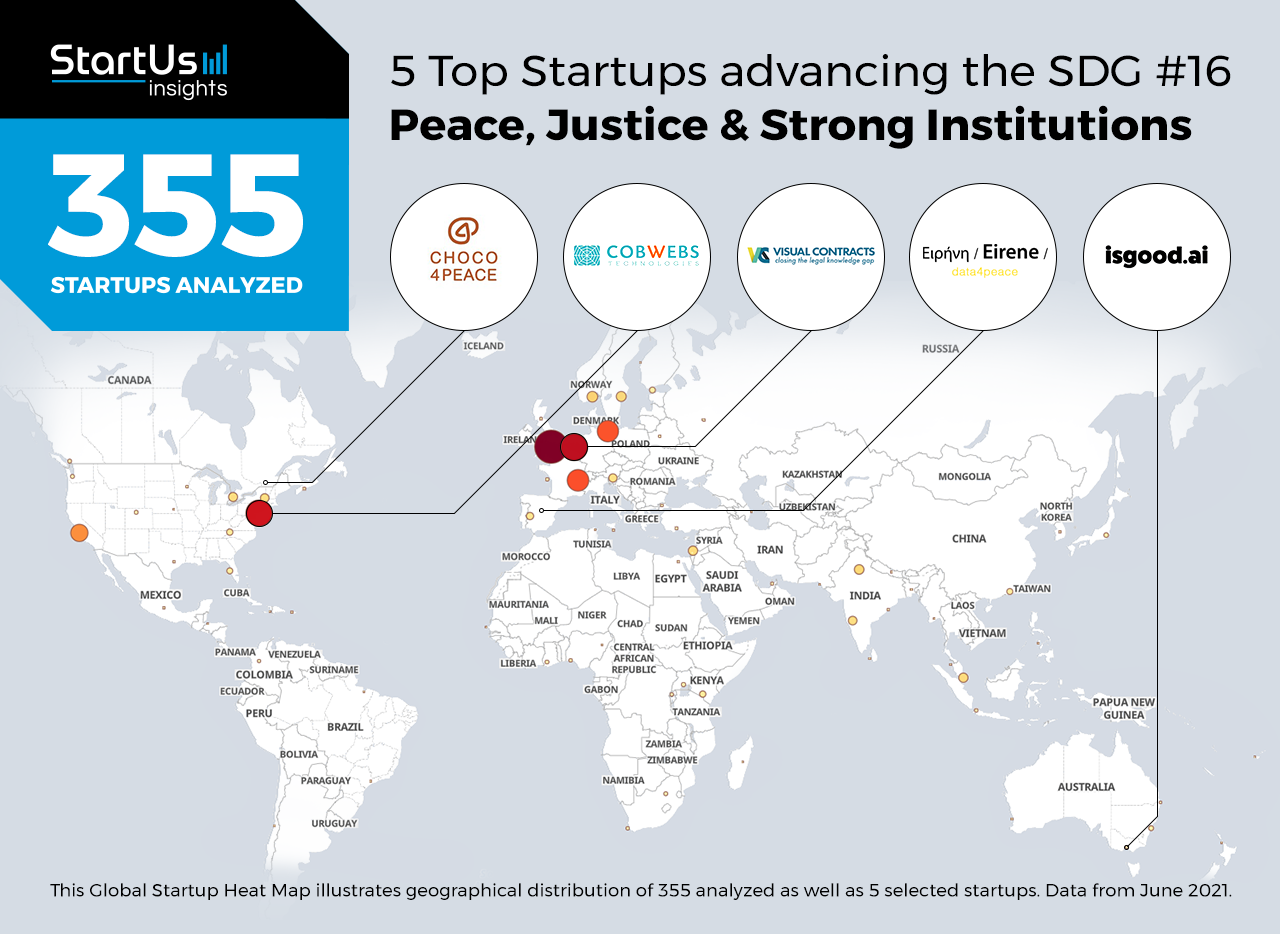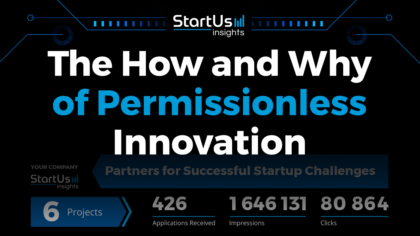Staying ahead of the technology curve means strengthening your competitive advantage. That is why we give you data-driven innovation insights. This time, you get to discover 5 hand-picked startups working towards the United Nation’s Sustainable Development Goal #16 – Peace, Justice & Strong Institutions.
Global Startup Heat Map highlights 5 Top Solutions advancing Peace, Justice & Strong Institutions out of 355
The insights of this data-driven analysis are derived from the Big Data & Artificial Intelligence-powered StartUs Insights Discovery Platform, covering 2.093.000+ startups & scaleups globally. The platform gives you an exhaustive overview of emerging technologies & relevant startups within a specific field in just a few clicks.
The Global Startup Heat Map below reveals the distribution of the 355 exemplary startups & scaleups we analyzed for this research. Further, it highlights 5 startups that we hand-picked based on criteria such as founding year, location, funding raised, and more. You get to explore the solutions of these 5 startups & scaleups in this report. For insights on the other 350 solutions, get in touch.
Cobwebs Technologies offers Threat Monitoring Solutions
With the proliferation of social media, terrorist groups and criminals alike increasingly use the web to recruit members and exchange information. This requires security agencies to monitor the web to prevent crimes and identify individuals at risk of radicalization or criminalization. However, the scale and anonymity of the task are daunting. This is why startups offer web intelligence (WEBINT) solutions for law enforcement, as well as financial institutions and corporate security.
US-based startup Cobwebs Technologies develops threat monitoring solutions. Trapdoor, the startup’s WEBINT platform, gathers intelligence from social media and other sources on the internet, such as mobile apps and dark web, as well as engages anonymously with threat actors. The platform uses machine learning algorithms to gain intelligence insights from big web data. Thereby, the startup assists with investigations ranging from anti-terrorism and terror financing to cybercrime, drug trafficking, and money laundering.
Choco4Peace uplifts Post-Conflict Regions
Conflict in any part of the world has far-reaching impacts across the globe. Yet, in post-conflict regions, industries have the potential to pave the way for economic recovery. However, investors are generally wary of doing business in such regions. To address this issue, social impact tools are leveraging digital tools and blockchain to promote trust. Moreover, such solutions allay consumer concerns about ethical sourcing.
Choco4Peace empowers at-risk groups in post-conflict regions of Colombia. The startup helps farmers adopt cacao cultivation for the chocolate industry. Choco4Peace uses blockchain technology to connect Colombian cacao farmers with markets, investors, and socioeconomic services. This allows consumers to trace the origin of their cocoa-based products and ensures that farmers are fairly compensated. The startup’s work also promotes other UN SDGs, including SDG #8 Decent Work & Economic Growth and SDG #12 Responsible Consumption & Production.
Visual Contracts addresses the Legal Knowledge Gap through Visual Contracts
For marginalized communities and small businesses, traversing legal documentation is often a challenge. The high costs of legal services present further obstacles to justice. This is where legal tech startups come in. By eliminating the complexity in legal procedures, startups are improving access to justice for all.
Dutch startup Visual Contracts builds a platform to close the legal knowledge gap. It creates easy-to-understand legal contracts that allow people to make autonomous decisions. Unlike traditional contracts that are only properly understood by courts or attorneys, the startup’s visual contracts incorporate visual elements and layout, making them easy to understand. In addition to empowering people to practice their rights, the startup’s solution also contributes to justice and economic growth at the levels of organizations and institutions.
isgood.ai enables Social Impact Measurement
Governments, nonprofits, and social impact startups run many initiatives fostering peace and justice at local, national, and global scales. However, there is a lack of clarity about if and how well they work. This is why social tech startups work on social impact measurement solutions. Such solutions quantify the positive and negative outcomes and manage their intended or unintended consequences.
Australian startup isgood.ai provides tech solutions to optimize and measure social impact. It uses AI to reveal complex patterns of cause and effect in social or humanitarian settings, thereby advancing the UN’s SDGs. The startup’s impact management solutions enable organizations to leverage the power of data to drive change. For instance, isgooda.ai helped an organization that works on youth homelessness and mental health issues to improve their data-collation practices.
Eirene promotes Local Participation in Conflict Zones
A large share of the global population currently lives in conflict zones. Lack of on-ground data from conflict regions hinders relief operations and development initiatives. The threat of violence often deters locals from driving change. This is why startups build anonymous solutions that help locals communicate with the outside world. In addition to bringing global attention to human rights violations, this facilitates greater local participation.
Spanish startup Eirene provides data on regions witnessing socio-economic, political, security conflicts. Using a secure and anonymous app, it assesses risk factors such as food prices, illegal mining, and incidences of violence to support decision-making. The startup helps public and private sector entities to increase the participation of local actors. For instance, in the Mosquitia region in Honduras, it strengthens the presence of local government bodies, promoting development and preventing human rights violations.
Discover more SDG startups
Startups such as the examples highlighted in this report focus on reducing inequalities, promoting economic growth, and encouraging partnerships. While all of these technologies play a major role in advancing the UN’s SDGs, they only represent the tip of the iceberg. To explore more technologies, simply get in touch to let us look into your areas of interest. For a more general overview, you can download our free Industry Innovation Reports to save your time and improve strategic decision-making.









